Mountain Gorilla Orphans Receive Annual Exams in DRC
By Gorilla Doctors Staff on Wednesday, May 1st, 2013 in Blog.After insecurity in eastern Democratic Republic of Congo prevented the Gorilla Doctors from traveling to Rumangabo for the annual mountain gorilla orphan exams in Februrary, the docs were recently able to make a day trip to the Senkwekwe Center to examine the only three mountain gorillas living in captivity in the world. Maisha, Ndakasi and Ndezi are each doing well and continuing to thrive under the health care of the Gorilla Doctors.
Ndakasi
Ndakasi was born into the Kabirizi family in 2007 and named after cherished Virunga National Park ranger Benjamin Ndakasi Lola, who had passed away earlier that year. The youngster was less than two months old when armed assailants attacked the Kabirizi family and shot adult female and mother Nyiransekuye. Soon after the attack, a group of park rangers trekked into the forest to search for the surviving individuals of the group. They found Ndakasi alive, still clinging to her deceased mother’s body. Ndakasi, being severely weak, dehydrated and close to death herself, was rescued by tracker Andre Bauma, who carried the infant out of the forest and brought her to the Gorilla Doctors for medical care. Andre has served as Ndakasi’s foster parent and primary caregiver ever since her violent ordeal and has grown into a healthy six-year-old subadult female mountain gorilla.
For more on Ndakasi’s story, please go to https://gorilladoctors.org/orphan-guardianship/ndakasi.html
Dr. Eddy’s Exam Report on Ndakasi:
Drs. Dawn, Mike, Martin and myself completed Ndakasi’s annual exam at the Senkwekwe Center in Rumangabo, DRC on April 4, 2013. During the annual health check, where Ndakasi was under general anesthesia, we completed a full physical examination, blood and fecal sampling, TB testing, vaccine and drug administration and an exam using the newly donated Toshiba portable ultrasound unit. Ndakasi weighed 48 kg at the time of this annual exam.
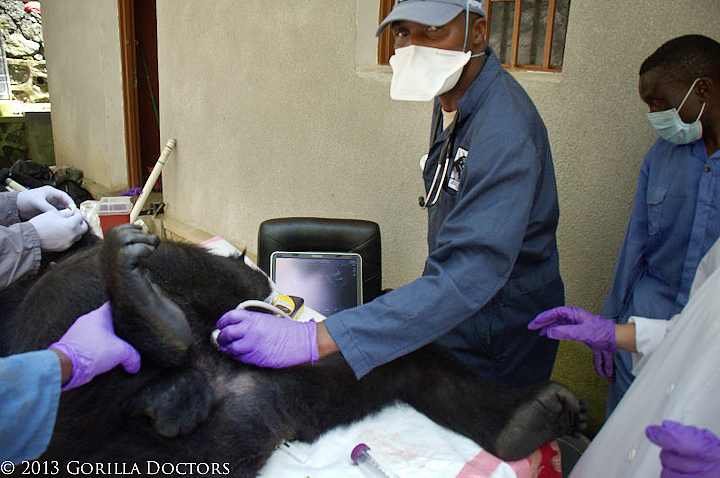 Dr. Eddy uses the new Toshiba portable ultrasound unit during Ndakasi’s annual exam.
Dr. Eddy uses the new Toshiba portable ultrasound unit during Ndakasi’s annual exam.
To prepare Ndakasi for her exam, she was injected with anesthetic in her left arm at 11:42am. Within 10 minutes, she was under the influence of the anesthesia and brought out of her enclosure to our exam table. Upon closer inspection, her upper incisors appeared to be worn on their internal side.
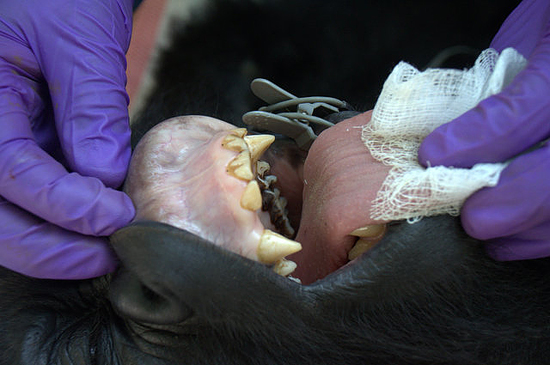 Docs examine Ndakasi’s teeth and gums.
Docs examine Ndakasi’s teeth and gums.
Her heart, lungs, abdomen, skin/hair, muscular/skeletal, lymph nodes, and neurologic exams were within normal limits. We took samples of blood, feces, urine, hair and took swabs of her nose, throat, rectum and vagina for future testing. We also took a punch biopsy on her right arm for germplasm cryopreservation.
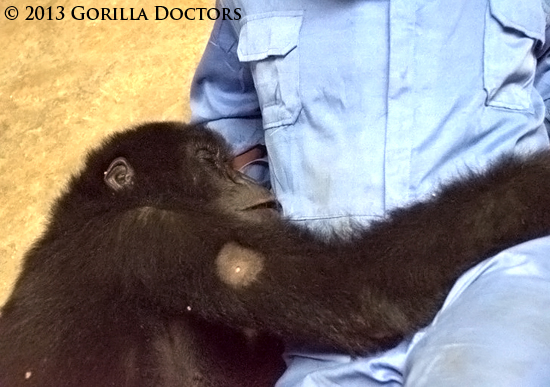 A punch biopsy was taken on her right arm for germplasm cryopreservation.
A punch biopsy was taken on her right arm for germplasm cryopreservation.
Atipamezole was administered at 12:30pm to reverse the anesthesia. By 12:42pm, Ndakasi was back on her feet with a good disposition. From the examinations performed on Ndakasi, we can conclude that her general health is good. However, we are investigating an anemia due to a possible nutritional deficiency.
Our plan for Ndakasi is as follows:
- Increase daily protein intake to prevent protein deficiency anemia.
- Give supplement of multivitamins + minerals on a daily basis to prevent non regenerative anemia.
- Give second deworming treatment of Ivermectin after two weeks (April 17, 2013)
- Maintain and reinforce quarantine regulations and policies: maintain basic hygienic condition in the facilities and avoid circumstances of stress.
- Weekly assessment of weight progress.
- Feed as much as needed.
Maisha
The early years of 11-year-old Maisha’s life is largely unknown, but we do know that she was born in Virunga National Park during a period of serious conflict in the region when rebels still used the park as a hideout and the forest was being cleared by farmers at an alarming rate. In December 2004, 3-year-old Maisha was poached from the park and brought to a cave in Rwanda where she was kept tied up inside a sack for two weeks and fed only corn and sugarcane.
After hearing rumors about the infant, Volcanoes National Park staff and the Rwandan police organized a sting operation: on December 18, 2004 they confiscated Maisha from the poachers, and she was turned over to Gorilla Doctors for treatment. Upon arrival she was thin and her nutritional state was very poor. No wonder: three-year-old gorillas still need milk to keep them healthy and the poachers had not given her any for many days. In collaboration with staff from the Fossey Fund’s Karisoke Research Center and caretakers from Volcanoes and Virunga National Parks, Maisha was nursed back to health and slowly recovered from the terrible trauma of her ordeal. While she had suffered greatly at the hands of humans, Maisha grew inseparable from her new human caretakers. She also became obsessed with eating, and to this day she jealously guards the best pieces of food at mealtime.
For more on Maisha’s story, please go to https://gorilladoctors.org/orphan-guardianship/maisha.html
Dr. Eddy’s Exam Report on Maisha:
Drs. Dawn, Mike, Martin and myself completed Maisha’s annual health check and while Maisha was under general anesthesia, we completed a full physical examination, an exam using the Toshiba portable ultrasound unit, blood and fecal sampling, TB testing, vaccine and drug administration. Ndakasi weighed 71 kg at the time of her exam.
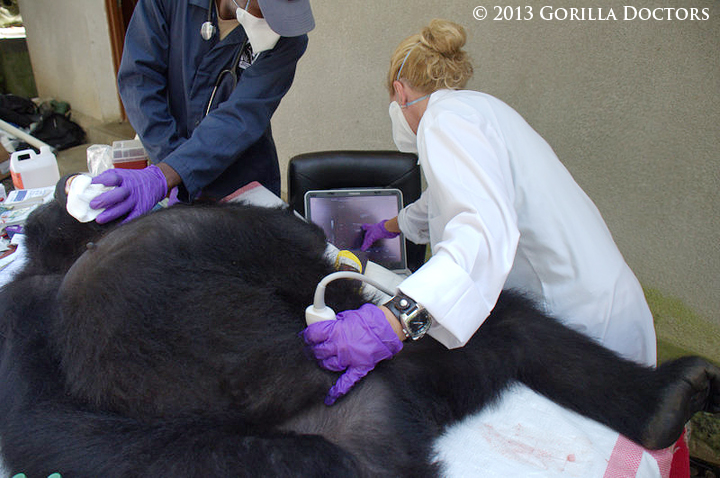 Dr. Dawn uses the newly donated Toshiba portable ultrasound unit during Maisha’s exam.
Dr. Dawn uses the newly donated Toshiba portable ultrasound unit during Maisha’s exam.
Maisha was darted with anesthetic at 9:05am in her right hip. After twenty minutes without any signs of the drugs affect, we made the decision to prepare a second full dose and dart again. At 9:30 am, Maisha was darted in her left back side . She was fully under anesthesia at 9:47am, allowing us to carry her out to the exam table.
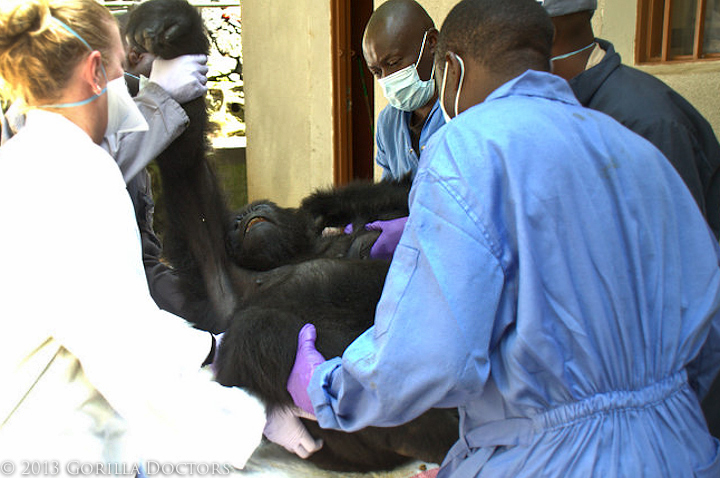 Carrying Maisha to the exam table after the anesthesia has taken effect.
Carrying Maisha to the exam table after the anesthesia has taken effect.
We noticed an irregular heart rate during Maisha’s examination. Her lungs were normal and clear to auscultation. Her abdomen was within normal limits, soft and half full. Skin and hair, as well as lymph nodes and neurological exams were within normal limits.
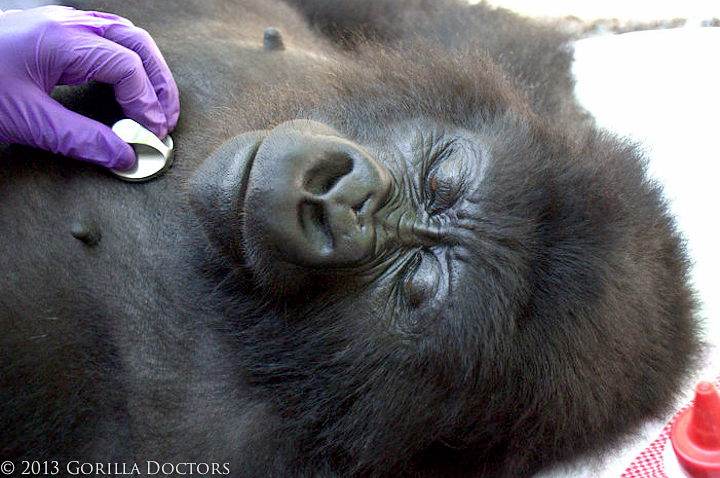 Docs listen to Maisha’s heart during her annual exam.
Docs listen to Maisha’s heart during her annual exam.
Blood, feces and urine samples were collected for testing, as well as swabs of the nose, throat, vagina and rectum. We did notice that Maisha had a significant number of strongle type eggs in her feces. Ivermectin was administered to help fight this.
The anesthesia reversal was given at 10:33am and she was back on her feet at 10:58am, making her total time under anesthesia at just about 1 hour.
The general health of Maisha appeared good: bright, strong and active with a good appetite. Her heart and breathing rates during anesthesia were irregular, however. Her TB test was negative.
Our plan for Maisha is as follows:
- Increase protein intake in daily diet to prevent protein deficiency anema.
- Give supplement of multivitamins and minerals.
- Increase daily water intake to strengthen kidney function.
- Give second deworming treatment of Ivermectin after 2 weeks (April 17, 2013)
- Maintain and reinforce quarantine regulations and policies, maintain basic hygienic condition of the facilities and avoid circumstances of stress.
- Weekly assessment of weight progress.
- Feed as much as needed.
Ndeze
Virunga National Park’s Rugendo family welcomed a new mountain gorilla into their family group on February 17, 2007. The infant of female Safari and silverback Senkwekwe was named Ndeze after a local chief who had died two days earlier. Her birth was celebrated in the international media as a hopeful sign for mountain gorillas in the park: just a month earlier, the park made headlines when two mountain gorillas were killed by rebel soldiers.
On July 22, criminals associated with the park’s illegal charcoal trade shot and killed 5 members of the Rugendo family, including Safari and Senkwekwe. After the massacre, the blackback Mukunda rescued baby Ndeze from her dead mother and made off with her to safety. Because Mukunda was a male and could not produce milk to feed Ndeze, the Gorilla Doctors, along with the Congolese Park Authority, made the decision to dart Mukunda with an anesthetic drug so that they could recover Ndeze and bring her into captivity.
Ndeze joined the younger orphan Ndakasi and caretaker Andre Bauma. Despite the trauma of the attack and being severely dehydrated, Ndeze quickly recovered. Ndeze proved to be an easy patient: she was sturdy and healthy and easily accepted medication for her common infant disorders like a sore throat or mild diarrhea.
For more on Ndeze’s story, please go to https://gorilladoctors.org/orphan-guardianship/ndeze.html
Dr. Eddy’s Exam Report on Ndeze:
6-year-old Ndeze was quickly visually examined before administration of anesthesia and she appeared to be in good general health with a good body condition. She was alert, responsive and active. At 10:52am (half dose) and again at 10:59am (half dose), we injected anesthesia into her right arm and back, respectively. The anesthesia quickly took effect, and we were able to weigh her to begin her exam.
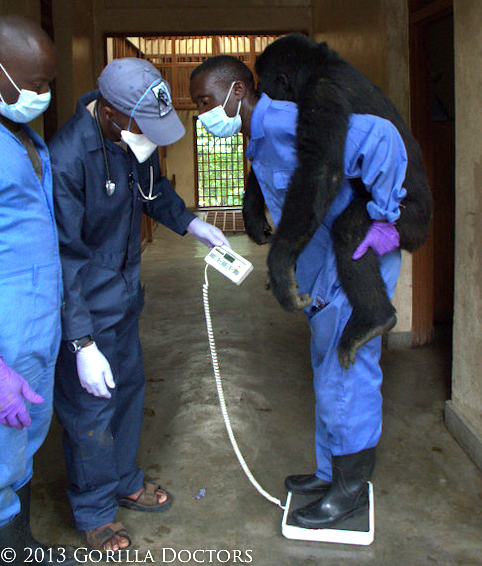 Weighing Ndeze during her annual exam.
Weighing Ndeze during her annual exam.
Ndeze’s skin/hair, lymph nodes, urinary/gonads, muscle/skeleton, heart/lungs, abdomen and nervous system were all within normal limits. Blood and fecal samples were taken, as well as swabs of her nose, throat and rectum for future testing. Ndeze was given Ivermectin for deworming, a tetanus and rabies vaccination as well as tested for TB (which was negative).
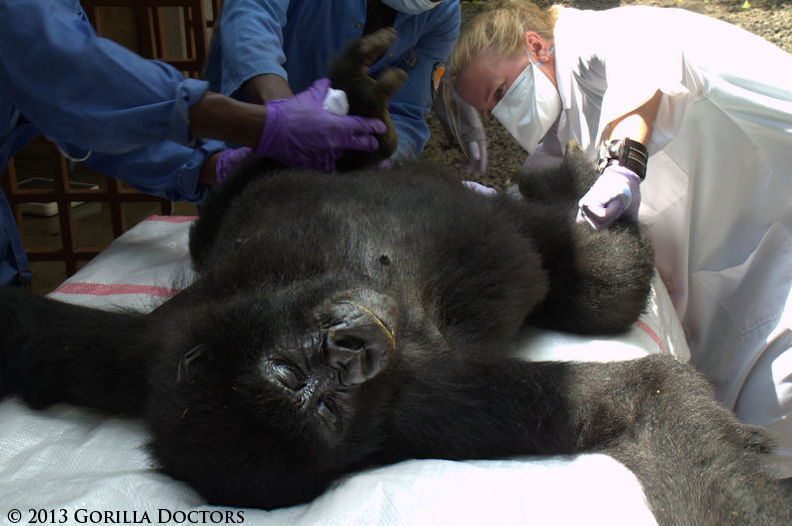 Dr. Dawn taking samples during Ndeze’s annual exam.
Dr. Dawn taking samples during Ndeze’s annual exam.
The anesthesia reveral Atipamezole was administered at 11:30am and she was back on her feet at 12:01pm with a good disposition after recovery.
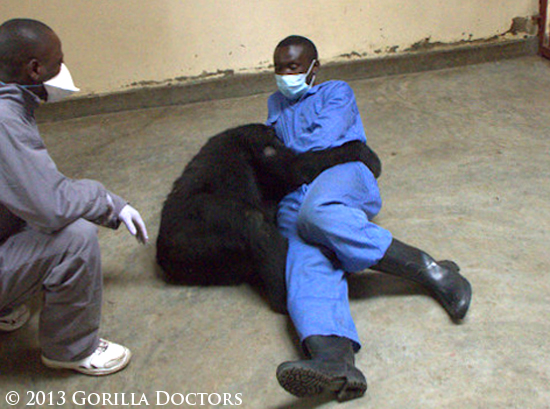 Ndeze waking up from the anesthesia in her night house with her caretaker.
Ndeze waking up from the anesthesia in her night house with her caretaker.
Here is our plan for Ndeze:
- Rangers keep close contact with Gorilla Doctors team to report health changes.
- Give second deworming treatment of Ivermectin after 2 weeks (April 17) and recheck after one month to confirm that the deworming was successful.
- Maintain and reinforce quarantine regulations and policies: maintain basic hygienic condition in facilities and avoid circumstances of stress.
- Continue annual examinations and routine fecal analysis as part of preventative medicine program.
You can follow the Gorilla Doctors health monitoring efforts on our Facebook page, where we post photos and notes from our monthly visits.
Please consider supporting us by making a secure online donation. Every dollar you give goes to directly supporting our gorilla health programs and One Health initiative. Thank you for your generosity.


 Donate
Donate